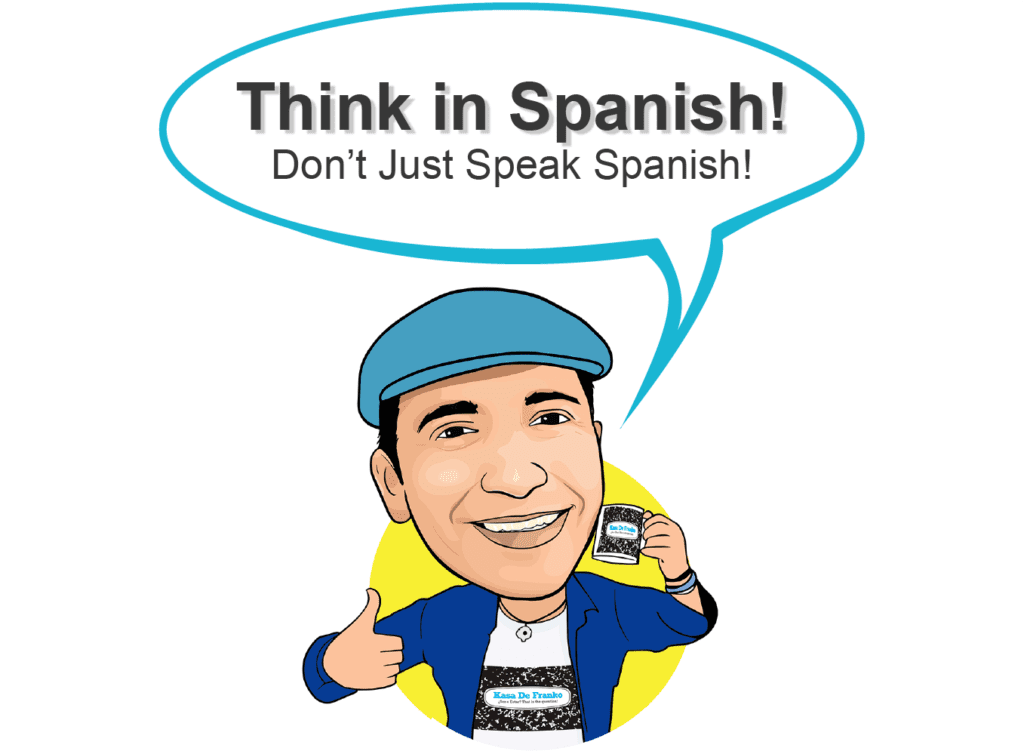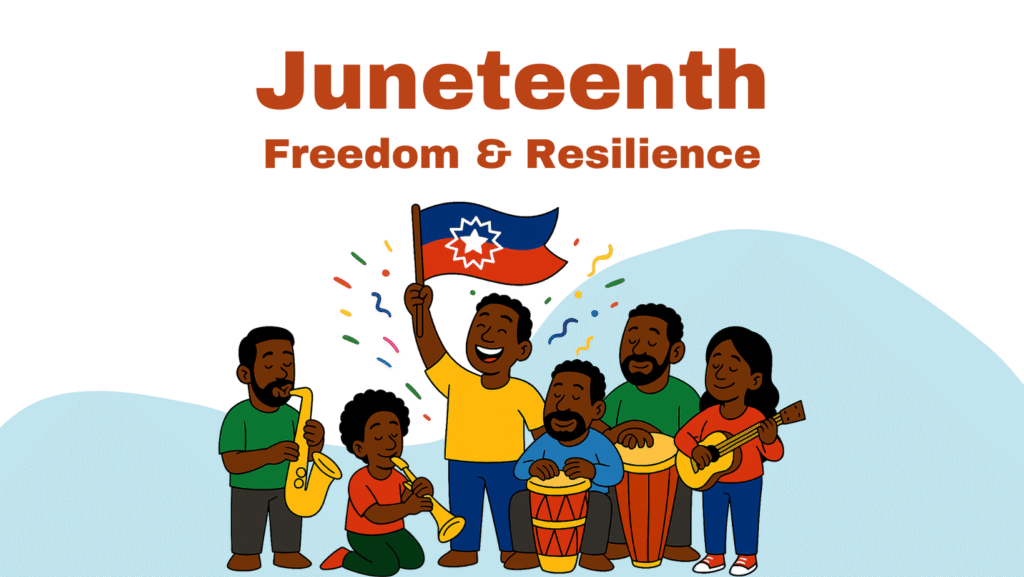
Honoring Freedom & Resilience
June 19, 1865. The hot Texas sun blazed down as Union soldiers arrived in Galveston. On their lips: freedom. On the faces of the enslaved: disbelief, then joy.
That day, long overdue and hard-won, would come to be known as Juneteenth—a celebration not just of emancipation, but of endurance, hope, and the ongoing struggle for justice.
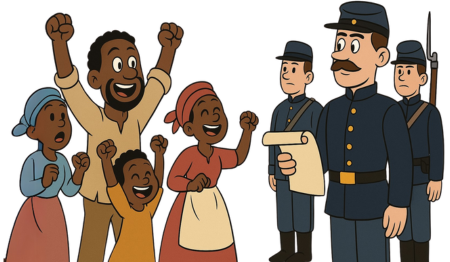
From Resistance to Recognition
Juneteenth isn’t just a day—it’s a heartbeat. A legacy still pulsing through generations, reminding us that freedom is fought for, not handed over.
That day didn’t come out of nowhere. It was the result of centuries of resistance, a war, and a proclamation that took way too long to reach the people it was meant for. So how did we get here?
Let’s rewind.

Origins & Evolution of Juneteenth
The news of freedom arrived in Galveston two and a half years after the Emancipation Proclamation had been signed. On that day—June 19, 1865—enslaved people in Texas finally learned they were free.
What began as local gatherings to mark that delayed liberation has grown into a nationwide celebration. Today, Juneteenth honors African American resilience through parades, barbecues, music, and moments of reflection—a vibrant tribute to the ongoing journey toward justice.
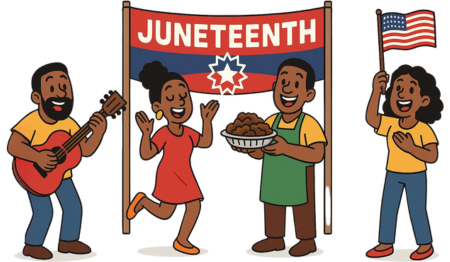
A Freedom Long Denied
The Emancipation Proclamation was signed by President Abraham Lincoln on January 1, 1863. But here’s the catch: it only applied to states in rebellion, and it couldn’t be enforced everywhere right away. So while freedom was promised, it wasn’t delivered—not immediately, and not equally.
Texas, remote and resistant, became a stronghold of slavery. Even after the Civil War ended in April 1865, many enslavers in Texas simply didn’t inform the people they held captive. Some historians say they deliberately withheld the news to squeeze out one last cotton harvest.
That’s why it wasn’t until June 19, 1865—when Union Major General Gordon Granger arrived in Galveston with federal troops and General Order No. 3—that the promise of freedom finally rang out loud and clear in Texas. And even then, it wasn’t freedom with open arms. It was freedom with resistance, violence, and uncertainty.
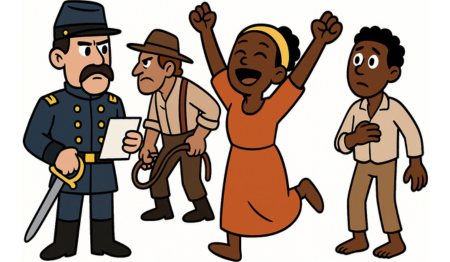
The Struggle After Freedom
Freedom didn’t mean safety. Or land. Or rights. What followed Juneteenth was a turbulent period known as Reconstruction—an era filled with both promise and betrayal.
Newly freed Black Americans built churches, opened schools, ran for office, and voted in record numbers. For a brief time, hope flickered. But white supremacist backlash came swiftly. The rise of Black Codes, voter suppression, and domestic terrorism—especially by the Ku Klux Klan—sought to claw back control.
By 1877, federal troops withdrew from the South, effectively ending Reconstruction and leaving Black communities vulnerable to violence, economic exploitation, and Jim Crow laws that would last nearly a century.
Still, the spirit of Juneteenth lived on. In spite of the setbacks, celebrations continued—first in homes and churchyards, then in city parks and community centers. It became a way to resist erasure, to affirm identity, and to remember that freedom isn’t just declared—it’s defended, generation after generation.
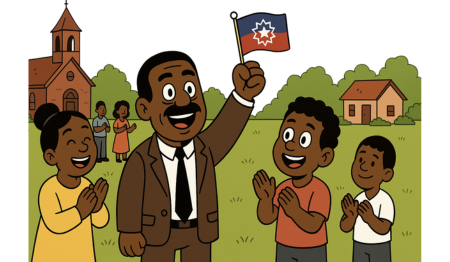
Black Leaders Who Carried the Flame
Even in the face of injustice, powerful voices rose up to demand a better future.
Frederick Douglass continued to fight for full citizenship and equal rights after emancipation, reminding the nation that abolition was only the beginning. Hiram Revels made history as the first African American U.S. Senator, representing Mississippi during Reconstruction.
Ida B. Wells put her life on the line to expose the horrors of lynching and advocate for civil rights. Booker T. Washington and Charlotte Forten Grimké championed education as the key to empowerment, building schools and curricula that would serve generations.
These leaders—and many others—kept the movement alive during the darkest decades. Their resilience, brilliance, and refusal to back down became the bridge from Juneteenth to the Civil Rights Movement and beyond.
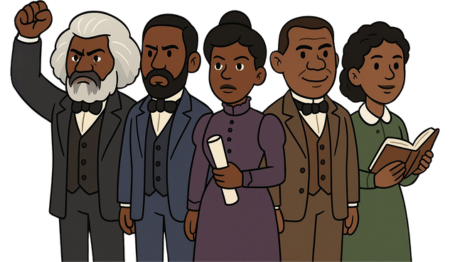
Emancipation Days Across the Americas
While Juneteenth marks the end of slavery in Texas (and effectively the U.S.), other nations in our hemisphere have their own “freedom days”—each with its own back‑story:
- Peru (Dec 3, 1854):
President Ramon Castilla signed the General Abolition Law, freeing the last enslaved people in Peru. Peru’s abolition was influenced by the wider Latin American wars of independence and debates over citizenship that swirled through Lima’s salons and Congress. - Argentina (1813 & 1853):
- “Liberty of Wombs” (Buenos Aires, 1813): Children born to enslaved mothers were declared free—a revolutionary first step during the South American independence wars.
- National Abolition (1853 Constitution): The new Constitution outlawed slavery outright, capping a decades‑long process that had already seen gradual emancipation in the provinces.
By weaving in these dates, you show that from Galveston to Lima to Buenos Aires, people fought for—and won—their freedom on different timetables, but with the same courage and conviction.
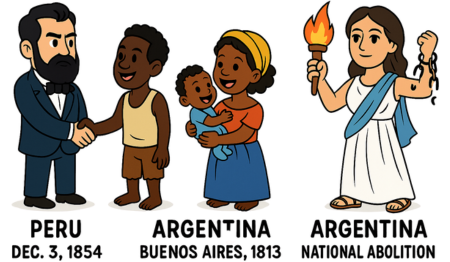
What About Other Countries?
Of course, Peru and Argentina are only part of the picture. Across the Americas, nations big and small tore down the walls of bondage on their own schedules:
- Mexico (1829): President Vicente Guerrero’s decree abolishes slavery—partially enforced in 1837.
- Chile (1823): Fresh from independence, Chile outlaws slavery outright in its first constitution.
- Uruguay (1842): Its 1830 constitution bans slavery in practice, with a formal law in 1842 cementing freedom.
- Colombia (1851): A nationwide decree ends slavery after years of staggered regional emancipation.
- Brazil (1888): The “Golden Law” finally frees all enslaved people—making Brazil the last in the Americas to abolish slavery.
- Cuba (1886): Spain’s royal decree brings freedom to the island’s last enslaved communities.

Party Time: Freedom & Equality
Juneteenth hits different. It’s joy with roots. Soul food, music, dancing in the streets—but also reflection, resistance, and real talk. It’s where celebration meets purpose.
This holiday honors the contributions and sacrifices of those who fought tirelessly for emancipation and civil rights. Through community gatherings, Juneteenth brings people together to celebrate progress and commit to building a more inclusive society.

Honoring a Rich Legacy
Juneteenth isn’t just a day off—it’s a day to look back, honor, and uplift. From the abolitionists who risked everything to the artists, educators, and civil rights legends who shaped American culture, this is a moment to reflect on generations of brilliance.
It’s a salute to Black excellence—to the trailblazers, creators, and change-makers who turned pain into power, and struggle into soul.

Juneteenth at Kasa de Franko
Here at Kasa de Franko, a leading Spanish language school serving the vibrant communities of the San Francisco Bay Area, Silicon Valley, and beyond, we totally get the spirit of Juneteenth.
We’re all about celebrating freedom and resilience. Through engaging educational activities, cultural events, and community outreach initiatives, we honor the significance of Juneteenth and highlight the importance of promoting equality and social justice for all.

KDF: Beyond the Bay Area!
Kasa de Franko’s commitment to celebrating Juneteenth goes beyond the Bay Area. We’re reaching students across the United States and Canada through our online programs and partnerships with educational institutions.
We provide individuals with the opportunity to deepen their understanding of Juneteenth and the African American experience, regardless of where they live.

Getting Involved in Your Community
There are so many ways to celebrate Juneteenth in your community. Whether you’re attending local events, volunteering with organizations dedicated to social justice, or just having meaningful conversations with family and friends, everyone can play a role in honoring the legacy of Juneteenth and advancing the cause of freedom and equality for all.
Whether you’re hitting up a community cookout, joining a local march, or just talking with your people over plates of food and stories—every act counts.

Legacy for Freedom & Equality!
Curious about how freedom, resilience, and cultural pride show up across American holidays? Head over to our “Homeland” blog section to dive into stories that spotlight American leadership and unsung heroes. Don’t miss “Hispanics Honored on Veteran’s Day”—a tribute to the anonymous heroes of the Hispanic community.
Both the African American and Hispanic communities have marched, fought, and dreamed side by side. So let’s honor that alliance—and celebrate love the Spanish way. Yeah, we mean sexy.

Spice Up Your Spanish with Romance
Want to add a touch of romance to your Spanish vocabulary? Check out our blog sections: “Things Spanish People Say in Bed” and “El Sexi Chupacabras”. You’ll find sensual phrases and learn how to say “I love you” in Spanish, among other romantic expressions.

In the Mood for a Laugh?
If you’re looking for some language-related humor, explore phrases like “¡Feliz Año Nuevo!” or “¡Me Gusta la Chucha de tu Madre!” While these might make you chuckle, remember to approach language learning with respect and cultural sensitivity. Embrace the richness of languages and dive into the vibrant world of Spanish-speaking cultures.

Fascinated by Legends and Folklore?
Delve into our “Legends & Folktales” section, where you’ll discover tales of mythical beings such as la Santa Muerte, la Llorona, la Ciguapa, El Sexi Chupacabras, and more from Hispanic traditions. Let’s now get back to celebrating Juneteenth!

More than Just a Holiday
As discussed, Juneteenth is more than just a holiday; it’s a celebration of resilience, freedom, and the enduring pursuit of equality. As we commemorate this historic day, let’s reflect on the progress we’ve made, acknowledge the challenges ahead, and recommit ourselves to building a future where everyone is treated with dignity, respect, and equality. Together, we can honor the legacy of Juneteenth and create a more just and inclusive society for generations to come.
So, grab your friends, join the festivities, and let’s make this Juneteenth one to remember! And don’t forget to sign up for your free Spanish lesson at Kasa de Franko – let’s celebrate freedom and learning together!

Free Lesson
To commemorate this important date, Kasa de Franko is offering Free Spanish Lessons. Take advantage of the free lessons offered at Kasa de Franko. It’s our way of giving back to the community and celebrating the rich cultural tapestry that Juneteenth represents.
Whether you’re a complete beginner or looking to brush up on your Spanish skills, join us for a fun and educational experience! Take advantage of the free lessons offered at Kasa de Franko. It’s our way of giving back…and always remember…
